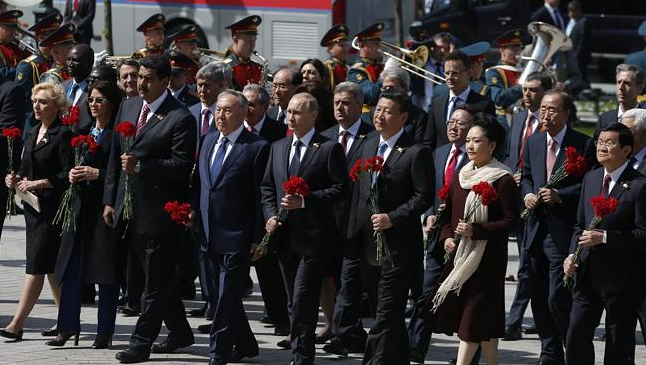
Friends in need are friends indeed, a saying goes. Yesterday Vladimir Putin, facing the most severe international political isolation in his fifteen years in power, was saved by a relatively small group of state leaders from diplomatic humiliation during Russia’s Victory Day celebrations in Moscow. Most notable, perhaps, was the presence of China’s Xi Jinping, India’s President Pranab Mukherjee and South Africa’s Jacob Zuma (in addition to Venezuela’s Nicolás Maduro). Except for Brazil, which was represented by Jaques Wagner, Minister of Defense (and possibly the governing party’s presidential candidate in 2018), the BRICS grouping thus again proved crucial for Russia to defy Western diplomatic and economic pressure: During Xi’s visit, countless agreements (largely in infrastructure) were signed between Russia and China.
Commentators in the Western media have played down the approximation between Moscow, Delhi and Beijing in the aftermath of Crimea Crisis. Yet it is difficult not to read recent events as a reaffirmation of a “RIC (Russia-India-China)” bloc at a time when Russia has few choices left. This scenario, of course, increasingly allows Delhi and Beijing to shape their ties with Moscow on their own terms. In a remarkable show to symbolic support, China and India sent military units to take part in the victory parade at the Red Square. This week, India’s Prime Minister Modi will travel to Beijing with a broad agenda to strengthen bilateral ties. Xi, Modi and Putin will all meet again in two months, when Russia will host the 7th BRICS Summit in Ufa, together with the meeting of the Shanghai Cooperation Organization (SCO).
In Moscow, Rousseff’s last-minute cancellation to attend her physician’s wedding (Russian newspapers had initially said she would attend) was read as a result of US pressure ahead of her trip to Washington next month. Yet rather than US influence, Rousseff, who is known not to relish air travel, most probably merely wanted to avoid the long trip to Russia so little time before her trip to Ufa.
The RIC grouping, meanwhile, is not a recent phenomenon and actually predates the BRICS. Russia, India and China started holding annual trilateral foreign minister-level meetings since the year 2001 to discuss security issues including migration, trafficking and terrorism. After the US invasion in Afghanistan, the regional implications of the situation there have been one of the important issues of debate. The relationship between Russia-India-China had thus been strengthened since the first trilateral meeting in Moscow in September 2001. Over the past years, encounters have either taken place on the margins of other events such as the UN General Assembly, or stand-alone meetings, such as in October 2007 when meetings of the foreign ministers of the three countries were held in Harbin (China) , or in 2013, when they took place in New Delhi.
As Russia is facing long-term estrangement from the West, the BRICS countries (and primarily India and China) will be increasingly important allies for Moscow, indispensable for keeping Russia economically and diplomatically connected to the rest of the world — as yesterday’s parade made clear.
Read also:
The G7 and the BRICS in the post-Crimea world order
The Forgotten History of Pre-Western Global Order
Photo credt: AP








